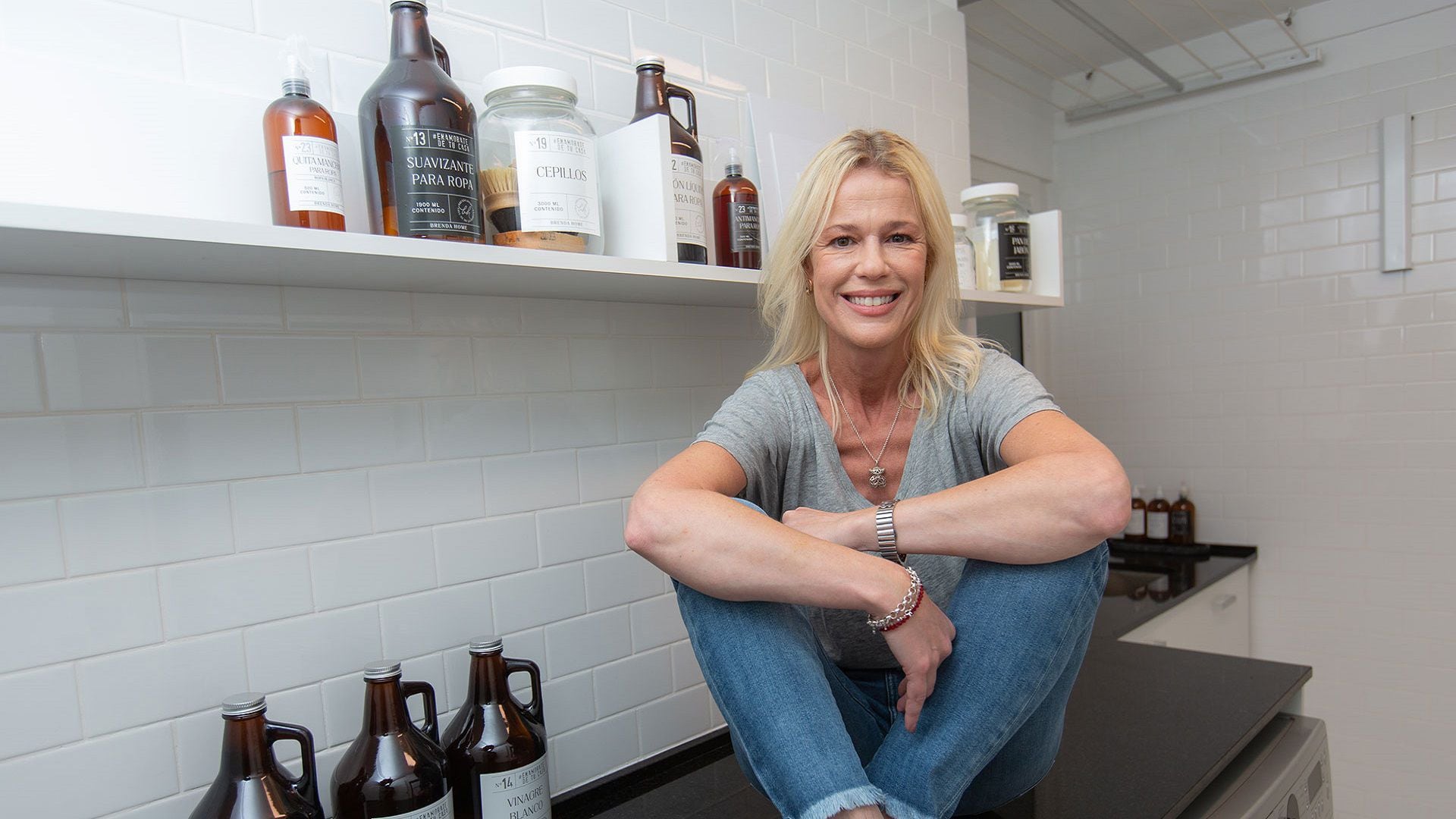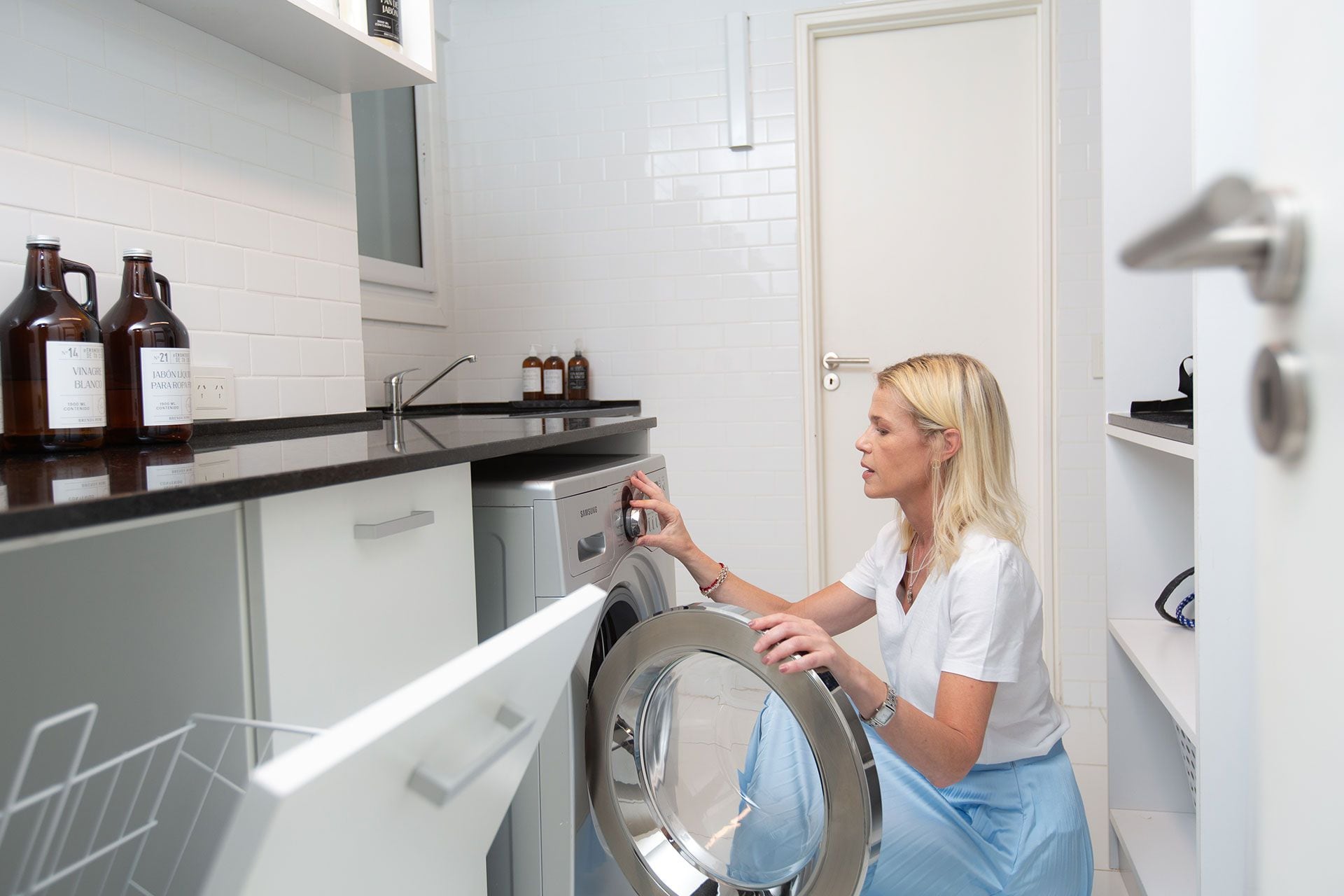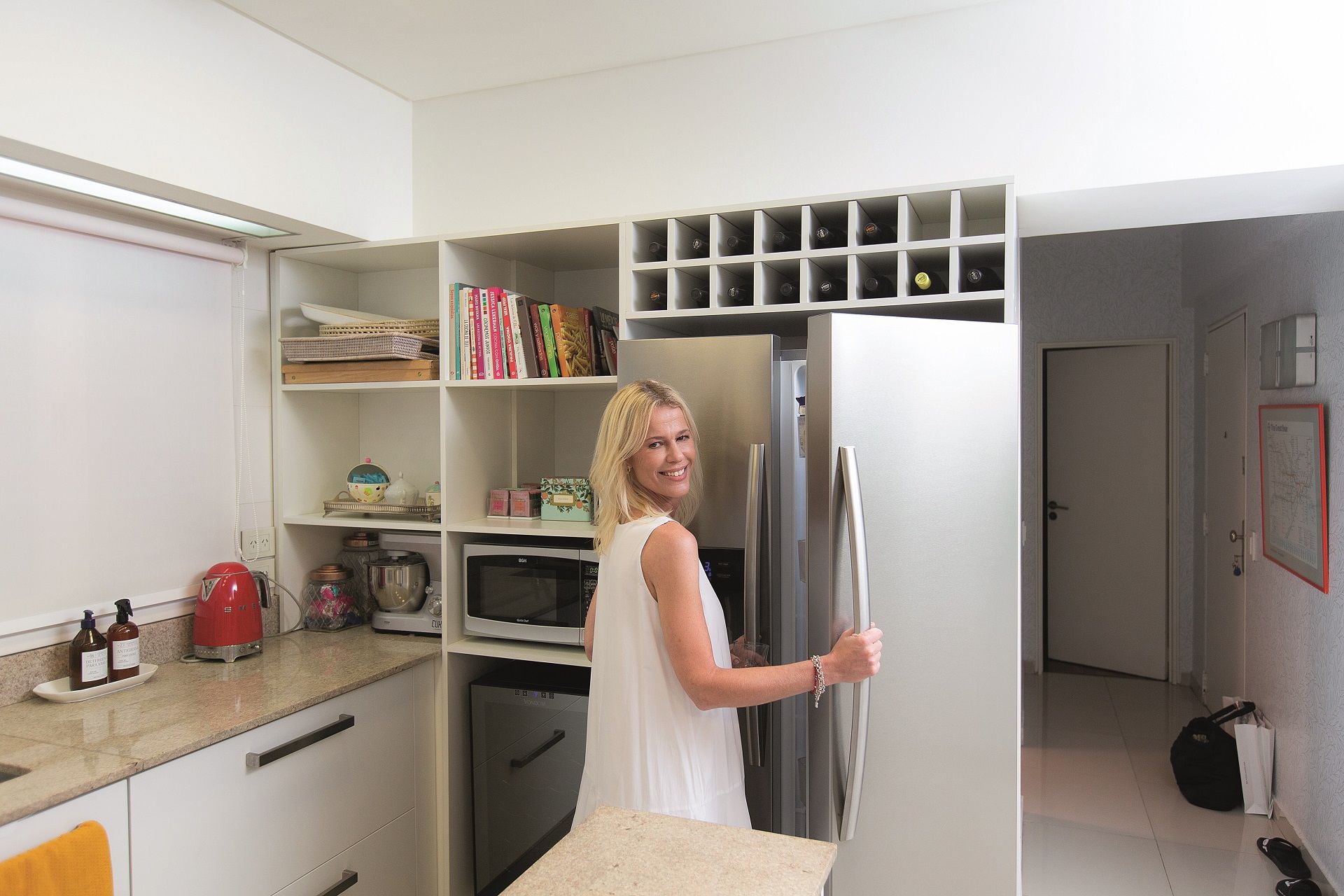
Maintaining order and cleanliness in a house is, for many, an arduous and tedious task or a waste of time, because we always have something more urgent or interesting to do. However, just as clean and tidy cities are more beautiful and friendly to live in, so does private space. A tidy and organized house promotes harmony, generates an environment of well-being and makes us feel better.
Passionate about her craft, Brenda Haines is in love with her art of ordering. She loves what many feel as a heavy and boring obligation. She is an interior designer and, after 15 years as a glassmaker and visual merchandising, in 2016 she decided to focus entirely on what she likes and works best for her: organizing spaces. Since then, his career has been a success, he has been organizing houses and companies for 6 years, he gave hundreds of workshops, published two books and has his own showroom with organizational accessories.
“Every time I go to a client's house to make an organization, the way they live and enjoy change radically, people connect differently with what they chose and begin to understand that they can live better when there is order,” Brenda tells Infobae.
For her, order is a habit that produces well-being and removes stress: “Living well happens through how we feel in the space we inhabit, that doesn't have to do with luxury or the number of square meters”. Brenda proposes to “think more about how we live, rather than where we live”, bring clarity and organize what we have “no matter how big or small, because when you are ordered, order reaches all other areas of life.”
Brenda is 46 years old and has three sons aged 10, 12 and 14, her home is spacious and harmonious like those that appear in decoration magazines. However, he insists that square meters are not so important, “the one who is messy, is messy in a studio apartment or in a 500-meter house, you can have more comfort, but it is a habit. It's like doing physical activity or eating healthy, it's a healthy habit. You can make a salad with organic vegetables from a gourmet shop, but it is also rich and healthy with the products of the greengrocer in front of your house.”
Through her years of experience visiting homes and arranging the lives of her clients, Brenda developed maxims suitable for all age groups, and thus showing that you can start organizing the house today, you just have to feel like it.
His advice is gathered in his recent book The 100 Commandments of Order and Cleanliness (Editorial Planeta). In dialogue with Infobae, Brenda reviewed the most important ones.
You'll never say “I'll save it later”
The first thing to keep in mind is that to be ordained you have to live in the present, not postpone or leave until tomorrow. Brenda explains that one of the most difficult maneuvers to undo is the one that promotes permanent disorder. Leaving everything we bring from the street in every corner of the house threatens order.
The wallet, keys and coat must be left in their assigned places, “things are not put where they fit, but where they belong”, he says. The assigned places are almost sacred spaces, it is advisable to always place each object in the same place we choose, not to leave them “parked” every day in a different corner.

Another of Brenda's maxims is that the things that accumulate rob us of space, so she recommends five daily tasks that are necessary to keep a house clean and organized: making the bed, storing clothes, washing the dishes, sweeping the floor and cleaning the bathroom, at least one refresher.
To have what is just and necessary, not to accumulate
Beyond the individual or family budget, much of the disorder arises from the excess of objects around us, Brenda insists that most people accumulate too much and shed little: “If you buy a new towel, another one has to come out”, the excuse “I could use it to paint ”, if a new object enters the house it is important to donate or throw away another, depending on the state in which it is located.
In the same vein, he postulates a series of commandments:
- You will not store everything you are afraid to throw away in the nightstand, nor will you have storage drawers
- You will not keep your children's clothes that no longer fit
- You won't keep things in the trunk in case there is a tsunami
- You won't keep quilts, blankets and pillows in case you ever have a pajamas party
To fulfill these and other objectives, it is important to detox objects, to get rid of those things that we did not use for years and they steal space in the house: broken necklaces and accessories in case one day we fix them, old and extravagant clothes in case one day we have a costume party or garments three sizes smaller in case we go down weight.
You won't clean superficially
“A house that is maintained from Monday to Friday with small habits, does not require big sacrifices on weekends. Many times we order superficially, the counter only at the top and when we open the drawers, we find a spell. Often in homes the biggest disorder is precisely the one you don't see,” Brenda explains to Infobae.
Cleaning and deep organization takes longer, but it pays off: “The order that is done in the background lasts forever, the one that is done superficially lasts just a little while.”
Where to start ordering
“I always recommend starting with the closet. Because every day we have to get dressed, it's nice to find the closet tidy in the morning, know what things you have, be able to choose what to wear and not dress as you can in the middle of the mess”, he recommends.
The next step is the kitchen, it is important to wash the dishes in the evening, to start the day well, and that when you arrive at breakfast it is a pleasant space to enjoy. And if the kitchen is the heart of the house, the laundry room is the main gear. It doesn't matter if it is not a separate room, it is the space that fulfills that function, where we clean the clothes that we are going to store and remove the dirt from the outside when entering our house.
To really keep the organization of a house, “you have to try not to have things in transit, a bag to return someone, or a box to take to the office or an artifact that needs to be fixed, things that don't have an assigned place to store, that causes a lot of disorder and a lot of stress and bad mood.”

Brenda proposes to establish a deadline for things that are going around the home: 30 days for exchange or return, as many businesses propose, “if in 30 days one did not return, store it, or arrange that object in transit, it must be disposed of”.
The order also applies to work, “what you don't do at home, don't do at work: the cup has to be taken to the kitchen and washed, you have to leave everything as tidy and as possible, as you like to find it”.
The difficult task of undertaking
“At the end of 2014 I wanted to do something different, something new, and I opened an accessories store in a shopping mall, it was horrible for me and in December 2015 I had to close it. I was turning 40 and I didn't want to make stained glass anymore, and I wondered how I reinsert myself, how do I continue. I spent 5 months walking around, I was at home and I wanted to go back to work and there I felt that when I was at home I had sharpened my eye like never before, I had always been very organized and one day I found myself folding the perfect towels and I said to myself: 'Why can't I make this a business? 'It's what I like, what I enjoy, it comes naturally to me and I think I do it well. '
His first idea was to write a book, a few months earlier a book by Marie Kondo, the Japanese organizer who pioneered the dissemination of order methods, had been published a few months earlier, which sold thousands of copies around the world. “You tend to underestimate what comes easily to you, although I liked the book a lot, it seemed to me that it lacked things that had to do with our idiosyncrasy and I said: 'I'm going to write a book for us Argentinians. '”
“I started writing every day and through word of mouth, I started going to the houses of familiar people to tidy up their houses, at first it was difficult, for a stranger to open closets and drawers, it wasn't something that people were used to, after that experience I started taking pictures and uploading them to Instagram.” Social networks are Brenda's great ally, in 2016 she had 200 followers, today follow her content on @tuespacioorganizado more than 1,100,000 people.

From day one, even when customers didn't show up, Brenda took her new job very seriously, “as if working in a multinational company”, posting things related to the order every day, up to three times a day. Little by little it grew, began to have business clients, ordered organizations, gave a workshop on order and organization and created the Professional Organizer of Housing, Offices and Commercial Premises course taught at the Argentine School of Business (EAN). In addition, for years it has had its own showroom with accessories to organize.
Revalue objects
When Brenda was young, her mother was very ill, when she was 10 years old, her mother got worse and she did not get out of bed for two years. Brenda, the youngest of three siblings, while her father worked much of the day, put the house on her shoulder and kept the order of the household. After many years of therapy, she understood that this was her response to maternal illness, taking charge of her home, providing care to her family through the organization and harmony of household objects.
After all, for Brenda, ordering and organizing people's homes consists of inhabiting spaces that generate well-being and revaluing the objects around us: “It is obvious that things have a useful life, but it is important to take care of objects, give them value, when you take care of them, take care of other things, it is to be attentive to things and people”.
Therefore, he emphasizes that it is not a question of expensive or economic objects: “A house is decorated when it is clean and tidy, no matter how small or spacious it is,” concludes Brenda.
KEEP READING:
Últimas Noticias
Debanhi Escobar: they secured the motel where she was found lifeless in a cistern
Members of the Specialized Prosecutor's Office in Nuevo León secured the Nueva Castilla Motel as part of the investigations into the case

The oldest person in the world died at the age of 119
Kane Tanaka lived in Japan. She was born six months earlier than George Orwell, the same year that the Wright brothers first flew, and Marie Curie became the first woman to win a Nobel Prize

Macabre find in CDMX: they left a body bagged and tied in a taxi
The body was left in the back seats of the car. It was covered with black bags and tied with industrial tape
The eagles of America will face Manchester City in a duel of legends. Here are the details
The top Mexican football champion will play a match with Pep Guardiola's squad in the Lone Star Cup

Why is it good to bring dogs out to know the world when they are puppies
A so-called protection against the spread of diseases threatens the integral development of dogs



